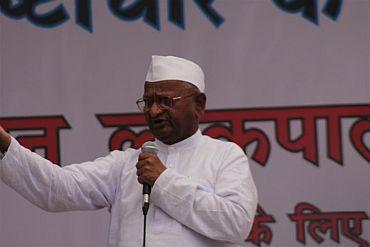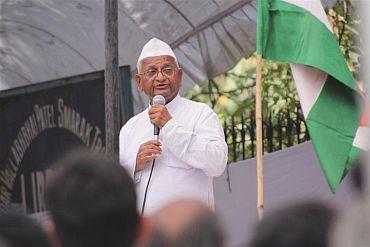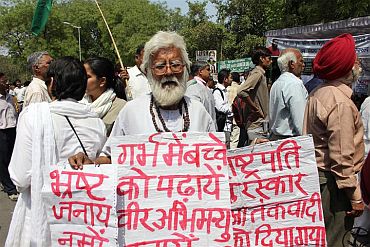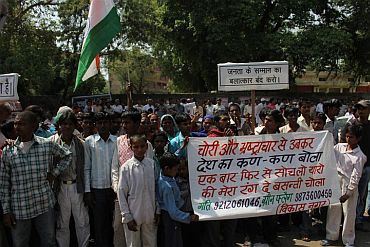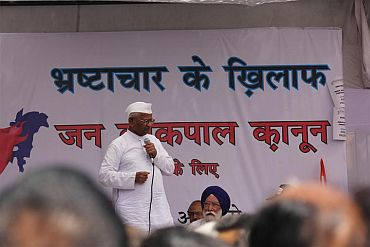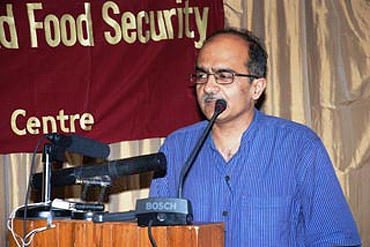 | « Back to article | Print this article |
'It's Sharad Pawar's old habit to indulge in corruption'
It's Sharad Pawar's old habit of indulging in corruption. Yes, I am levelling charges. Take me to court, I will prove the allegations," said activist Anna Hazare in New Delhi, as he began his fast unto death strike against corruption on Monday.
Hazare's is campaigning for a compressive Lok Pal Bill to give wider powers to the ombudsman to check corruption attracted a huge crowd of over 3,000 people at Jantar Mantar in New Delhi. Noted reformist Swami Agnivesh, former Indian Police Service officer Kiran Bedi, Right to Information activist Arvind Kejriwal and Supreme Court lawyer Prashant Bhushan were among the prominent personalities showing their support to Hazare.
Hazare's fight is against the Lok Pal Bill. The draft of the new bill to deal with corruption is ready since 2010, but the government's intention is to present its watered-down version, which many activists are opposing. Experts believe that even if the bill is passed in Parliament it won't nail corruption.
Click on NEXT to read further...
'Sub-committee looking into Lok Pal Bill should comprise non-ministers'
Today, no police station is filing even a First Information Report against any corrupt judge because the law requires permission of the Chief Justice of the Supreme Court," said Bhushan pointing out to the many existing loopholes in the bill. Bhushan has proposed an alternative -- let the Sonia Gandhi-led National Advisory Committee prepare the draft of the Lok Pal Bill and become the interface between the civil society and government.
The talk of corruption is futile unless the law against corruption is strong, believe activists. Precisely to make this demand Hazare, a Gandhian, is in New Delhi. He is all set to take on the Manmohan Singh-led government unless his demand is met. As a first step he wants to ensure that the sub-committee of the Group of Ministers headed by Defence Minister A K Antony to look into the Lok Pal Bill should also have non-ministers and non-bureaucratic members.
How Hazare mastered the art of human resource management
Hazare is an extraordinary leader. He is a former army man who took voluntary retirement after 15 years. Years ago fed up of life, he wanted to commit suicide but on a railway station in New Delhi he found the book on Swami Vivekananda's vision. He picked up the book and threw away the two-page suicide note. From there on, there was no looking back and he decided to work towards serving the nation and vowed to remain a bachelor. For the last four decades, he has been following Vivekananda's message -- the ultimate motive of human life should be service to humanity.
This message he wanted to spread among thousands who turned up at Jantar Mantar on Monday. He told people, "I do have my home in the village but I have not entered it for the past 35 years. I have implemented schemes costing several crores, but I do not have bank balance."
Hazare has done wonders over the years, one of which made him a name to reckon with. He brought about development in Ralegaon Sidhi, his native village with help of watershed management, soil preservation, improving crop patterns and other native ideas. The village not only become a tourist hub but is also a living example of India's struggle for development. Through this project, Hazare mastered the art of human and resource management.
'Corruption a bigger threat than Pakistan'
And hence this reformist cannot be taken lightly. As long as he survives he will continue to fight. "I will survive a fast for 15 days. I don't have diabetes, blood pressure or any other illness," he said.
"Back home I have a plate to eat and a bed to sleep. I don't need anything more. Life is pure bliss," he added.
He warned that in last 62 years corruption has become so rampant in country that it has become a bigger threat than Pakistan.
Hazare's fight against the corrupt dates back to the early 1990s. He then took up the issue of corruption and led a non-compromising crusade against ministers. So far, eight Maharashtra ministers have been forced to resign due to his issue-based and upright movement against corruption. His glorious fight for the Right to Information Act is well-known in Maharashtra.
Much before Sonia Gandhi pushed for the RTI Act, Hazare made sure that people in Maharashtra enjoyed the right to know where politicians were spending the public's money and how. He started his RTI agitation in 1997 and in 2003 he realised his dream.
Dr Manmohan Singh's government does understand the seriousness of Hazare's fast and this was clear from the statement issued by the PMO. "The prime minister has enormous respect for Hazare and his mission," it said. In fact, the PMO had withdrawn one line on a second-thought from its statement. "The PMO believes that in the best democratic tradition there has to be give and take."
What Hazare's draft of the Lok Pal Bill demands
Hazare and his group had presented the prime minister a draft of their proposal on the Lok Pal Bill. According to the PMO, the prime minister offered and the group accepted a suggestion that a sub-committee of the Group of Ministers could interact and discuss the draft with the civil society activists. "The sub-committee, headed by Antony met Hazare's colleagues but the interaction proved fruitless as the activists were insisting on the government accepting their draft in full," the PMO said.
This claim is, however, is being refuted by Bhushan. He told rediff.com, "We are not saying that our draft should be accepted in full. We want that our draft should be the base-draft and then we should discuss the differences and improve upon it."
'Latest draft of Lok Pal Bill a complete eyewash'
The group called People against Corruption argues that the Lok Pal Bill has been introduced eight times in Parliament since 1968. All the eight versions have been very weak. Even these weak versions have not been passed so far because the Lok Pal Bill seeks to investigate politicians. The latest draft of the bill prepared by the present UPA government is a complete eyewash. Rather than strengthening the anti-corruption systems, it demolishes whatever exists in the name of anti-corruption systems today. It seeks to completely insulate politicians from any kind of action.
Bhushan said, "We have three major differences with the Lok Pal Bill prepared by the government. We want a broad-based committee to select a Lok Pal while the government wants a three-member committee to choose a Lok Pal from the pool of retired judges who can be pliable or corrupt or both. We want a transparent procedure."
"We want a committee to be formed consisting of two retired Supreme Court judges, two high court judges, the Speaker of the Lok Sabha, the vice-president, Chief Election Commissioner, Chief Vigilance Commissioner, chairman of the National Human Rights Commission and the Comptroller and Auditor General of India. They should select the Lok Pal with the help of a completely transparent procedure," he added.
'Lok Pal Bill needs to take action against manipulation of policies'
Second, the activists are arguing since years that the Lok Pal should be empowered to conduct an inquiry sou moto or any citizen can ask for inquiry when they face corruption. Right now, only the Speaker or the vice president and chairperson of the Rajya Sabha can refer the cases to Lok Pal at the Centre. That limits the scope and influence of the Lok Pal.
Third, the Lok Pal's report and findings are referred back to the Speaker or the vice president but the new bill by Hazare and others recommends that the Lok Pal must have power to prosecute, make amendments, and order redressal. For example, if someone has been asked to pay a bribe to get a ration card and the if the Lok Pal finds evidence of it then it must have power to help the victim get his ration card.
Bhushan gave two examples to justify the agitation launched by Hazare. He said, "The Lok Pal Bill is very, very important. There is a demand side to corruption and a supply side for a stringent law. When there is only one provision for an airport, or one supplier of electricity or water then corruption takes place more easily. The policy of privatisation has increased the scope of corruption. How do you stop it?"
Bhushan added, "Today itself I fought the case involving an issue of Rs 20,000 crore against electricity distributors in New Delhi. They wanted to increase the tariff by 60 per cent but an honest chief of the electricity regulatory board found manipulation in the figures. He prepared the order to decrease the tariff in New Delhi by 20 per cent on basis of newly-audited figures. But, the government restrained him from issuing a pro-people order and forced him to retire. Two other corrupt members of the board helped Reliance and Tata to have their way."
"We need Lok Pal Bill in such cases that involve fraud to the tune of Rs 20,000 crore. You can bribe someone Rs 100 crore and make your Rs 20,000 core annually. These issues are too serious and India needs a bill to take action against manipulation of policies."
And hence Hazare's fast unto death is important for tackling corruption head-on.
